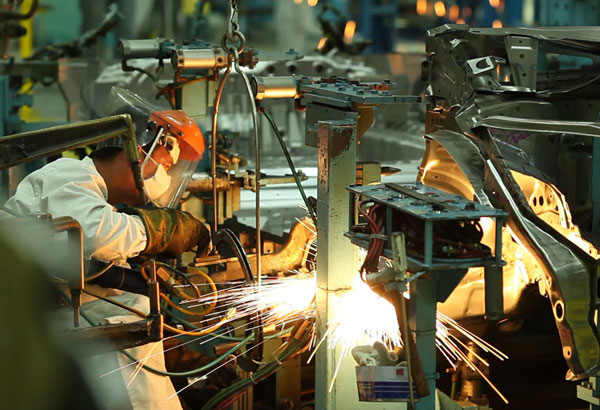TRAIN slows factory runs in January

The Nikkei Philippine Manufacturing PMI registered a reading of 51.7 in January, down from 54.2 in December. This signals a modest improvement in the health of the sector, contrasting with solid expansions in recent months.
MANILA, Philippines — Manufacturing slowed down in January as demand was partially hurt by the imposition of new excise taxes, according to the Nikkei Philippine Manufacturing Purchasing Managers’ Index (PMI) released yesterday.
The Nikkei Philippine Manufacturing PMI registered a reading of 51.7 in January, down from 54.2 in December. This signals a modest improvement in the health of the sector, contrasting with solid expansions in recent months.
The latest reading was the third lowest since the survey for the Philippines started in January 2016 but remains within expansion territory as a reading below 50 indicates decelerating business conditions.
The headline PMI is a composite index based on five key indicators: new orders, output, employment, suppliers’ delivery times and inventories of inputs.
Slower growth was seen in output and new orders, said IHS Markit, the firm that collated data for the PMI. Weaker client demand resulted in spare capacity and led firms to hire less workers.
Inflationary pressures also intensified, with higher costs having an adverse effect on the purchase of inputs.
“While the Philippines manufacturing economy ended last year on a high, it started 2018 on a more modest note as demand was partially hurt by the new excise taxes,” said IHS Markit principal economist Bernard Aw.
The 12-month outlook for production, however, remain optimistic because of the encouraging economic outlook.
“Other survey indicators suggest firms are likely to look past the near-term slowdown toward stronger growth in the year ahead,” said Aw.
A downside risk to growth, he said, would be a renewed pick up in the prices of inputs. Survey data showed input costs rising sharply, pushing Fiipino manufacturers to raise selling prices at a record pace.
“The key driver for inflation came from supply-side factors, rather than demand. Anecdotal evidence showed that new excise taxes, a weak exchange rate and higher global commodity prices, especially in oil, metal and plastics, all pushed inflation higher,” said Aw.
Socioeconomic Planning Secretary Ernesto Pernia expressed confidence that the negative effect of the Tax Reform for Acceleration and Inclusion (TRAIN) Law on consumption would last for only a couple of months as the market adjusts.
This means consumers will be more conscious of their spending as they evaluate the sustainability of their their new spending power and producers will find ways to lower operating cost and deliver products at prices acceptable to the market.
“The kick in inflation would be highest in the first year and, over time, it just tapers off,” Pernia said. “It’s an adjustment in a competitive market. Consumer behavior and producer behavior will adjust.”
The cost of living would also be greatly reduced in the long-term once the major infrastructure projects are completed because transportation cost would be lower both for commuters and transporter of goods.
“Because a lot of the cost of goods is transportation and logistics,” he said.
The TRAIN Law, which was implemented beginning January, lowers personal income taxes resulting in higher take homes pay but imposes higher tax on fuel, automobiles, sugary beverages and tobacco.
- Latest
- Trending






























